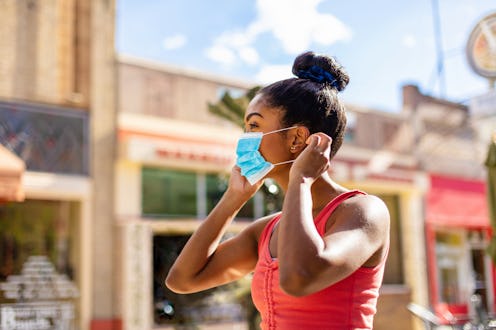Health
More Young COVID Patients Are Reporting Symptoms That Last Beyond 2 Weeks
One survey found that nearly half of young adults still have a cough after they’re supposed to be recovered.

In the nearly five months since COVID-19 was declared a pandemic, the disease has been shown to hit older folks especially hard — leaving young people to let their social distancing guard down, rationalizing that "it won't be that bad." Although the majority of people recover from COVID-19 without needing to be hospitalized, scientists are beginning to see respiratory and heart damage from COVID that lasts beyond the initial recovery period. According to emerging research, even people with mild COVID symptoms can have long-term health complications.
One survey, conducted by the Centers for Disease Control and Prevention (CDC), found that even people whose illness wasn't deemed severe enough to warrant hospital admission had long-lasting symptoms. Among nearly 300 people surveyed who had tested positive for COVID but not been admitted to a hospital, 35% had not recovered fully by two or three weeks after diagnosis. Nearly 50% of those surveyed who had experienced coughing symptoms when testing positive still had a cough between 14 and 21 days later. One in five people between the ages of 18 and 34 had no preexisting conditions but were still not fully recovered within three weeks.
Another study, published in the journal JAMA Cardiology, found that 78% of people diagnosed with COVID-19 had structural changes in their hearts two months after apparent recovery. Of the 100 study participants, who ranged in age from 45 to 53, most had no preexisting conditions, and only 33% had been hospitalized, while the remaining 67% had gotten better at home. Still, 78 people presented with physical changes in their heart that typically develop after someone has a heart attack. And 60 people had myocarditis, or heart inflammation.
In order to prevent this kind of long-term damage, the CDC strongly recommends that young adults who don't have underlying conditions remain consistent with social distancing practices, wear masks in public, and wash hands frequently. Though some folks feel relaxed enough about COVID to kick it at a Chainsmokers concert, the CDC notes that safety precautions should remain a top priority for people who might mistakenly think the disease isn't that big of a deal.
Studies referenced:
Tenforde MW, Kim SS, Lindsell CJ, et al. Symptom Duration and Risk Factors for Delayed Return to Usual Health Among Outpatients with COVID-19 in a Multistate Health Care Systems Network — United States, March–June 2020. MMWR Morb Mortal Wkly Rep 2020;69:993-998. DOI: http://dx.doi.org/10.15585/mmwr.mm6930e1
Puntmann, V.O. (2020) Outcomes of Cardiovascular Magnetic Resonance Imaging in Patients Recently Recovered From Coronavirus Disease 2019 (COVID-19). JAMA Cardiology, https://jamanetwork.com/journals/jamacardiology/fullarticle/2768916